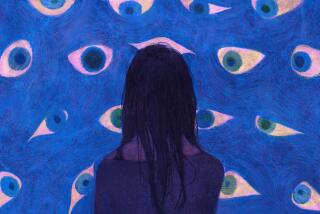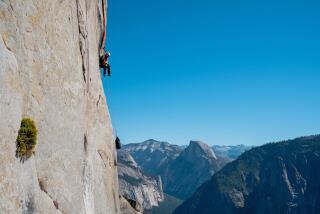He Took Plunge Into Fear : After Losing Sight 13 Years Ago, Greg Evangelatos Has Rebuilt His Life and Is Helping Others Do the Same Through Sports
- Share via
Brown-tinted sunglasses shade Greg Evangelatos’s blue eyes, hiding them from light that he cannot see. Evangelatos is blind, his retinas permanently damaged in a 1980 fireworks accident when he was 18. Although he is sightless, he is not helpless. Not by a longshot.
Evangelatos, 31, has plenty of life in his life. The Carson resident lives on the Cal State Dominguez Hills campus, where he is studying business administration and communications. He is the founder of the 8-year-old National Disabled Foundation (NDF), an organization designed to help people with disabilities develop self-confidence and friendships through sports. And he is a member of the United States Disabled Cycling Team and the U.S. Disabled Ski Team, with Paralympic medals in both sports.
Through athletics, Evangelatos has reached goals that he once would have thought impossible. And, through athletics, he has rebuilt a life that, for a time, he considered to be worthless.
A self-described “rambunctious child,” Evangelatos was fascinated with fireworks as a kid. When he reached his teens, Evangelatos learned how to make them himself, and he developed a hobby of producing bootleg firecrackers for friends. Then one hot July day 13 years ago, the hobby literally blew up in his face.
Seated in his Encino bedroom after a swim, Evangelatos was mixing flash powder in a porcelain bowl for a batch of firecrackers. Distracted, he measured wrong, and when he set the bowl down the powder exploded. Fragments of porcelain were sent rocketing around the room, tearing apart his hands and ransacking his inner eyes.
The explosion tore apart his psyche as much as it did his body.
“I was really a wreck,” Evangelatos said. “It was miserable. I didn’t want to live. There were a couple of times when I had planned out my suicide. I’d just break out into tears when I just thought about meeting another girl or going out with a friend, even just going out for a hamburger in a restaurant. I felt very uncomfortable just being out in public.
“I was scared. I was really scared for my future. I didn’t see how I could go on being blind.”
Evangelatos spent the better part of the two years shuffling back and forth from hospital to home, undergoing extensive surgery to repair his eyes and hands. With one retina believed salvageable, his family took him to eye specialists in England and Germany for a special, experimental surgical procedure.
The surgery failed; the damage to his retina was final. The realization was horrific to Evangelatos: He would never see again. But as horrible as that thought made him feel, it also brought him a strange feeling of relief.
For two years, Evangelatos’ parents had guarded him like a hothouse flower, shielding him from anything that might jeopardize his chances to regain his eyesight. He had become a virtual shut-in, had begun to feel old and fragile at age 20. But now all doubt was removed. He had nothing left to lose.
“Once I knew that I was permanently blind, I was in a way relieved, because now I wouldn’t be treated like an old man,” Evangelatos said. “My eyesight couldn’t be damaged any worse. Knowing that I was going to be blind the rest of my life was scary, but on the other hand, I knew then that I could at least start to explore my new life again.”
Exploring his “new life” meant that Evangelatos would have to get out and meet people to become socially active again. He took up judo at the Braille Institute, but that proved too limiting for him. After all, how many friends can you make when you’re locked in hand-to-hand combat with them?
Seeking sports that he could do in the company of family and friends, Evangelatos began skiing and cycling. In order to ski, Evangelatos would follow a sighted guide who shouted back directions to him. For cycling, Evangelatos used a tandem bicycle, with a sighted pilot in the front seat.
Once he became more active, Evangelatos’ world began to open up. He began to come out of his shell, developing the pride he needed to begin dating again and forge friendships with disabled and able-bodied people.
“With sports, self-confidence was restored,” Evangelatos said. “I started to get involved with other people, started forming relationships and having fun again. I started to feel accepted again.”
Still, traces of self-pity haunted Evangelatos until, on a ski trip in 1982, Evangelatos had an experience that transformed the way he thought of his disability.
Evangelatos, sitting in the ski lodge at Mammoth Mountain with a paraplegic friend, needed to use the restroom. His friend, Tim, also needed to use the restroom. Since neither was able to make the journey alone, they joined forces, Evangelatos pushing Tim’s wheelchair while Tim guided him to the bathroom.
“While I was pushing him, I realized how lucky I was to have my legs,” Evangelatos said. “Even though I was blind, I could still go running with my friends, I could stand up, I could walk, and I realized that I sure had a lot to still be thankful for. Tim’s misfortune was much worse than mine.”
When he told Tim of his thoughts, though, he was surprised at his friend’s response.
“He told me that it was kind of funny, because he had been thinking the same thing,” Evangelatos said. “He was thinking that he’d much rather have his eyes than his legs.
“Through meeting each other, we had stopped feeling so sorry for ourselves. We were both thankful for what we had, and we didn’t feel so sorry for what we didn’t have anymore. From that point on, I just wasn’t so sad. My friends and family even told me that when I came home from that trip, all of a sudden I started smiling more.”
Since the experience at Mammoth, Evangelatos’ life has transformed. He founded the National Disabled Foundation in 1985 in order to help other people with disabilities to better their lives through sports. The foundation organizes cycling, skiing, and other sporting events that include disabled and able-bodied athletes in order to foster increased communication between the groups.
His athletic career has blossomed as well. In February, 1992, in Albertville, France, Evangelatos and his ski partner won a gold medal in the giant slalom competition at the Winter Paralympics. Half a year later in Barcelona, Evangelatos and his tandem partner won a silver medal in cycling, making Evangelatos, to the best of his knowledge, the first American male ever to earn medals in the Winter and Summer Paralympics.
“It was all so unbelievable,” Evangelatos said. “I couldn’t believe it all happened. It took about six months for it all to sink in. When you win something like that, when you reach that type of goal, you feel like you’re dancing on air.”
However, that goal achieved, Evangelatos has set about improving the NDF, and he plans to resign from the U.S. Disabled Ski Team this fall after 10 years of competition to spend more time on the foundation.
“It’s time for me to make a decision in my life,” Evangelatos said. “Do I want to continue to be an athlete or do I want to direct this foundation? (Directing the foundation) is my true goal now. I’d rather be skiing, I’d rather still be an athlete, but I know that if this foundation is really going to be a success five or 10 years from now, I need to start now.”
With all that he has overcome, there would seem to be little left to scare Evangelatos. Still, when he examines the daunting task ahead of developing the NDF into a national organization--he has plans to open an NDF in St. Louis in the next few years--he heeds the advice he follows on the slopes.
“When I’m scared that I’m losing my guide, I just have to plunge forward and bite the bullet and go for it,” Evangelatos said. “I have to plunge into my fears. Whenever I’ve done that I’ve always been able to ski better and follow my guide and prevail.”
More to Read
Go beyond the scoreboard
Get the latest on L.A.'s teams in the daily Sports Report newsletter.
You may occasionally receive promotional content from the Los Angeles Times.










